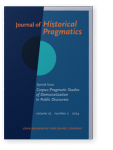Women’s voices in the public sphere
Processes of (discursive) democratisation in London suffrage newspapers
As alternative media, suffrage periodicals played an important role in women’s fight for universal suffrage, which
marked a milestone on the road to democracy. Opening up a space for women in public discourse, these papers shaped and were shaped
by processes of democratisation. This study explores how they balanced informative, propagandistic and commercial functions, and
how women positioned themselves and others as social actors in the context of the movement, challenging gender ideologies. In line
with
Rühlemann and Aijmer’s (2015) notion of corpus pragmatics, the study combines the
assets of corpus-linguistic methods, e.g., by drawing on keywords as pointers to relevant areas of interest, with a pronounced
qualitative perspective, complementing the search results by features demanding manual analysis and discussing the findings in
their socio-historical context.
Article outline
- 1.Introduction
- 2.Democratisation in the context of this study
- 2.1A socio-cultural/political perspective on democratisation and the suffrage movement
- 2.2A linguistic perspective on democratisation
- 3.Data and methods
- 3.1Contextualisation of the data
- 3.2Composition of the sample corpus and approach
- 4.Facets of democratisation in suffrage newspapers
- 4.1Democratisation, propaganda and commercialisation
- 4.2Women as social actors in the democratisation process
- 4.2.1General references to women (and men)
- 4.2.2Roles of social actors
- 4.2.3Two opposing camps? Suffragettes and suffragists
- 4.2.4Activities of social actors
- 5.Immediacy and distance
- 6.Conclusion
- Acknowledgements
- Notes
-
References
-
Corpora, primary sources and text collections
